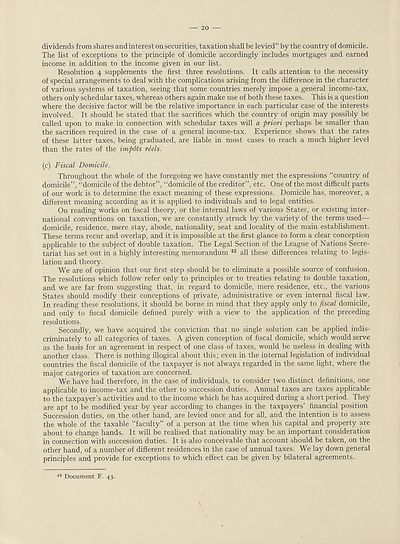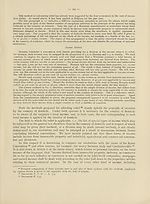Download files
Complete book:
Individual page:
Thumbnail gallery: Grid view | List view

20
dividends from shares and interest on securities, taxation shall be levied” by the country of domicile.
The list of exceptions to the principle of domicile accordingly includes mortgages and earned
income in addition to the income given in our list.
Resolution 4 supplements the first three resolutions. It calls attention to the necessity
of special arrangements to deal with the complications arising from the difference in the character
of various systems of taxation, seeing that some countries merely impose a general income-tax,
others only schedular taxes, whereas others again make use of both these taxes. This is a question
where the decisive factor will be the relative importance in each particular case of the interests
involved. It should be stated that the sacrifices which the country of origin may possibly be
called upon to make in connection with schedular taxes will a priori perhaps be smaller than
the sacrifices required in the case of a general income-tax. Experience shows that the rates
of these latter taxes, being graduated, are liable in most cases to reach a much higher level
than the rates of the impots reels.
(c) Fiscal Domicile.
Throughout the whole of the foregoing we have constantly met the expressions “country of
domicile", “domicile of the debtor’’, “domicile of the creditor’’, etc. One of the most difficult parts
of our work is to determine the exact meaning of these expressions. Domicile has, moreover, a
different meaning according as it is applied to individuals and to legal entities.
On reading works on fiscal theory, or the internal laws of various States, or existing inter¬
national conventions on taxation, we are constantly struck by the variety of the terms used—
domicile, residence, mere stay, abode, nationality, seat and locality of the main establishment.
These terms recur and overlap, and it is impossible at the first glance to form a clear conception
applicable to the subject of double taxation. The Legal Section of the League of Nations Secre¬
tariat has set out in a highly interesting memorandum 42 all these differences relating to legis¬
lation and theory.
We are of opinion that our first step should be to eliminate a possible source of confusion.
The resolutions which follow refer only to principles or to treaties relating to double taxation,
and we are far from suggesting that, in regard to domicile, mere residence, etc., the various
States should modify their conceptions of private, administrative or even internal fiscal law.
In reading these resolutions, it should be borne in mind that they apply only to fiscal domicile,
and only to fiscal domicile defined purely with a view to the application of the preceding
resolutions.
Secondly, we have acquired the conviction that no single solution can be applied indis¬
criminately to all categories of taxes. A given conception of fiscal domicile, which would serve
as the basis for an agreement in respect of one class of taxes, would be useless in dealing with
another class. There is nothing illogical about this; even in the internal legislation of individual
countries the fiscal domicile of the taxpayer is not always regarded in the same light, where the
major categories of taxation are concerned.
We have had therefore, in the case of individuals, to consider two distinct definitions, one
applicable to income-tax and the other to succession duties. Annual taxes are taxes applicable
to the taxpayer’s activities and to the income which he has acquired during a short period. They
are apt to be modified year by year according to changes in the taxpayers’ financial position
Succession duties, on the other hand, are levied once and for all, and the intention is to assess
the whole of the taxable “faculty” of a person at the time when his capital and property are
about to change hands. It will be realised that nationality may be an important consideration
in connection with succession duties. It is also conceivable that account should be taken, on the
other hand, of a number of different residences in the case of annual taxes. We lay down general
principles and provide for exceptions to which effect can be given by bilateral agreements.
42 Document F. 43.
dividends from shares and interest on securities, taxation shall be levied” by the country of domicile.
The list of exceptions to the principle of domicile accordingly includes mortgages and earned
income in addition to the income given in our list.
Resolution 4 supplements the first three resolutions. It calls attention to the necessity
of special arrangements to deal with the complications arising from the difference in the character
of various systems of taxation, seeing that some countries merely impose a general income-tax,
others only schedular taxes, whereas others again make use of both these taxes. This is a question
where the decisive factor will be the relative importance in each particular case of the interests
involved. It should be stated that the sacrifices which the country of origin may possibly be
called upon to make in connection with schedular taxes will a priori perhaps be smaller than
the sacrifices required in the case of a general income-tax. Experience shows that the rates
of these latter taxes, being graduated, are liable in most cases to reach a much higher level
than the rates of the impots reels.
(c) Fiscal Domicile.
Throughout the whole of the foregoing we have constantly met the expressions “country of
domicile", “domicile of the debtor’’, “domicile of the creditor’’, etc. One of the most difficult parts
of our work is to determine the exact meaning of these expressions. Domicile has, moreover, a
different meaning according as it is applied to individuals and to legal entities.
On reading works on fiscal theory, or the internal laws of various States, or existing inter¬
national conventions on taxation, we are constantly struck by the variety of the terms used—
domicile, residence, mere stay, abode, nationality, seat and locality of the main establishment.
These terms recur and overlap, and it is impossible at the first glance to form a clear conception
applicable to the subject of double taxation. The Legal Section of the League of Nations Secre¬
tariat has set out in a highly interesting memorandum 42 all these differences relating to legis¬
lation and theory.
We are of opinion that our first step should be to eliminate a possible source of confusion.
The resolutions which follow refer only to principles or to treaties relating to double taxation,
and we are far from suggesting that, in regard to domicile, mere residence, etc., the various
States should modify their conceptions of private, administrative or even internal fiscal law.
In reading these resolutions, it should be borne in mind that they apply only to fiscal domicile,
and only to fiscal domicile defined purely with a view to the application of the preceding
resolutions.
Secondly, we have acquired the conviction that no single solution can be applied indis¬
criminately to all categories of taxes. A given conception of fiscal domicile, which would serve
as the basis for an agreement in respect of one class of taxes, would be useless in dealing with
another class. There is nothing illogical about this; even in the internal legislation of individual
countries the fiscal domicile of the taxpayer is not always regarded in the same light, where the
major categories of taxation are concerned.
We have had therefore, in the case of individuals, to consider two distinct definitions, one
applicable to income-tax and the other to succession duties. Annual taxes are taxes applicable
to the taxpayer’s activities and to the income which he has acquired during a short period. They
are apt to be modified year by year according to changes in the taxpayers’ financial position
Succession duties, on the other hand, are levied once and for all, and the intention is to assess
the whole of the taxable “faculty” of a person at the time when his capital and property are
about to change hands. It will be realised that nationality may be an important consideration
in connection with succession duties. It is also conceivable that account should be taken, on the
other hand, of a number of different residences in the case of annual taxes. We lay down general
principles and provide for exceptions to which effect can be given by bilateral agreements.
42 Document F. 43.
Set display mode to:
![]() Universal Viewer |
Universal Viewer | ![]() Mirador |
Large image | Transcription
Mirador |
Large image | Transcription
Images and transcriptions on this page, including medium image downloads, may be used under the Creative Commons Attribution 4.0 International Licence unless otherwise stated. ![]()
| League of Nations > Economic and financial section > Double taxation and tax evasion > (26) |
|---|
| Permanent URL | https://digital.nls.uk/190911646 |
|---|
| Shelfmark | LN.II |
|---|
| Description | Over 1,200 documents from the non-political organs of the League of Nations that dealt with health, disarmament, economic and financial matters for the duration of the League (1919-1945). Also online are statistical bulletins, essential facts, and an overview of the League by the first Secretary General, Sir Eric Drummond. These items are part of the Official Publications collection at the National Library of Scotland. |
|---|---|
| Additional NLS resources: |
|

